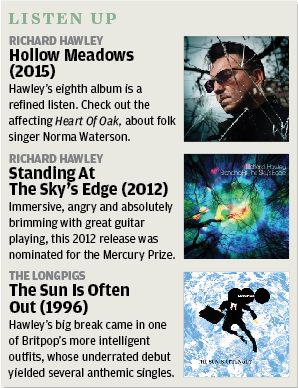Interview: Richard Hawley – Hollow Meadows
After a turbulent period that saw Richard Hawley questioning whether he’d play live again, one of the UK’s finest songwriters and owner of a guitar collection to make grown men weep with envy returns triumphant with new album Hollow Meadows…

Live photography: Eleanor Jane
Richard Hawley is in a good place again. “I’m in a world where I’m playing guitar with my mates and having the time of my life on tour,” he tells Guitar & Bass, safely ensconced in a Glasgow hotel room preparing for a sold-out show at the city’s Barrowlands venue and reflecting on a year in which he released his eighth album, the serene and reflective Hollow Meadows.
The path hasn’t always been so smooth in recent years for the confirmed Gretsch fanatic and owner of one of popular music’s most desirable vintage guitar collections. Such feelings of contentment and inner peace are a welcome tonic after a recent history that’s seen one of Sheffield’s most famous sons endure a leg break, fight off a subsequent addiction to the prescription drug Tramadol and then suffer a back injury that led doctors to advise Hawley he might never walk again.
The accident in 2013, in which he sustained a slipped disc, resulted in Hawley being forced to spend five months in bed, trapped in his own mind. It left the 48-year-old questioning his existence.
That feeling of uncertainty is documented on one of Hollow Meadows’ stand-out tracks. On the stirring Which Way, with its wailing Bigsby vibrato-lashed soloing, a vulnerable-sounding Hawley backed by gospel harmonies pleads for clarity as he considers his mortality: “Give me some directions please/solid ground is all I need/won’t you tell me, which way do I go?”
Salvation came, fittingly for a man inexorably linked to his home city, from the hands of the Sheffield Wednesday Football Club physio Paul Smith, and Hawley is grateful to be back in a position of contentment that he’d begun to doubt he’d ever find again.
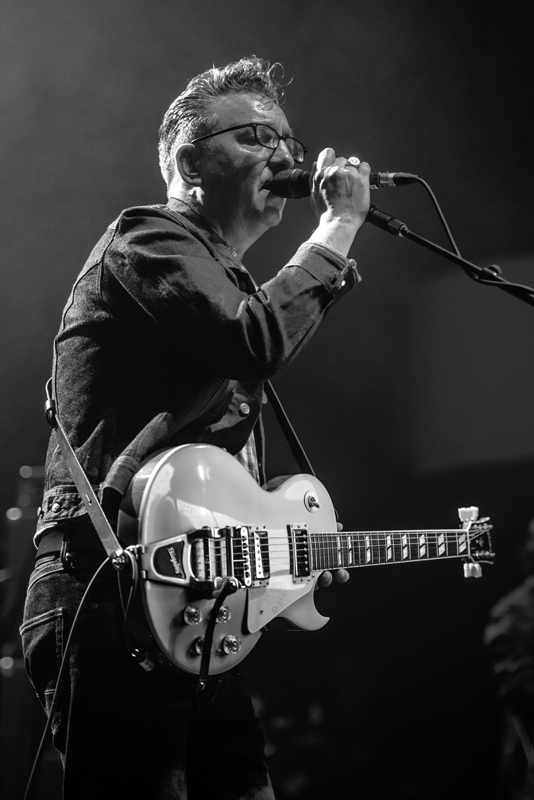
“If I was writing the album this year, it would have been a better place, but when I was writing that album I didn’t know if I would walk again, and that was fucking terrifying – doing my back in, and they told me that I’d probably not walk again,” Hawley recalls in his treacly nicotine-coated tones.
“That was pretty scary, then laying on your back for five months… the thing that got me through in the end was Paul Smith, who told me ‘I am going to make you better’. Having that absolute rock-solid assurance that you don’t need surgery and you don’t need all this stuff they’re telling you that you need, that it��’s going to be alright, was good.”
“I was in a position where I thought ‘I don’t know what the fuck is going to happen’. Like a lot of people, you get to a certain point in life where you think ‘Is this it? Is it over?’. Tonight, we’re playing at Glasgow Barrowlands, it’s sold out and it’s definitely not over. And I’m glad about that! [laughs]”
Hollow Meadows, released in September, found Hawley in contemplative, soulful mood – unsurprisingly given the period of enforced introspection that surrounded its conception. Its wistful ruminations on age, mortality and relationships stripped-back arrangements and gentle acoustic playing stand in contrast to the rich wall of sound and driven, bit-between-the-teeth approach that characterised 2012’s Standing At The Sky’s Edge. We ask if those two releases are direct embodiments of the phases of life in which they were written.”
“Every album is,” Hawley acknowledges. “It’s the different ages of man, I guess – or this particular man. I find it difficult to write songs in any other place than where I am mentally and in terms of life. I’m 48 years old, not 28 and I don’t want to pretend that I am. So I guess a lot of people might listen to it and not get it because they’re young. I’m not saying it’s specifically an album that was made for older people, but it’s definitely an album that’s made at this time of life.”
“There are no rules. I’ve not got a specific way of writing. With Standing At The Sky’s Edge I knew I needed to do something with volume involved, and possibly distortion. I didn’t realise that it was going to go as far as it did. I’m glad it did and in some ways I could have taken it further, but there’s always another record somewhere down the line where I can experiment.”
“I collect sound and experiment with sound. It’s not necessarily X guitar or that bass. It’s sonics I’m interested in, I’m not even interested in musicianship, particularly, as a definite thing – it’s sound that interests me.”
Top gear
The recording of Hollow Meadows, which was demoed in Hawley’s shed studio that he calls ‘Disgracelands’, saw him indulging his long-held passion for collecting vintage gear, tracking through a trio of lust-worthy old amps and playing an array of gorgeous guitars including his ’56 Gretsch 6120 and a pair of Eastwoods. One shopping trip to Lincolnshire with long-time friend and folk songwriter Martin Simpson – who contributed slide guitar and banjo parts to the album – proved particularly fruitful.
“I recorded most of the record in the shed, me and Shez [co-producer Shez Sheridan],” says Hawley. “I met a guy called Norman Mitchell, who runs Old Hat Guitars in Horncastle, and I bought an old Chet Atkins Gretsch amp off him. I’d already got one that I’d had for years, and I took it up to him on the recommendation of Martin Simpson. Martin came with me and bought an old Magnatone amp and I bought this old Chet Atkins 1963 amp – I use that a lot.”
“I also bought a 1955 Gibson ES-295, which is in pristine condition. They’re rarer than hens’ teeth, and with it came a Gibson GA-19 amp that was sold on the same day with the guitar. I use that a load and I bought a Fender Blues Deluxe that was souped up by Norman for a harmonica. I plugged it in and just fell in love with it. I begged him to sell it to me, which he did bless him. It was those three amps that I used on the record.”
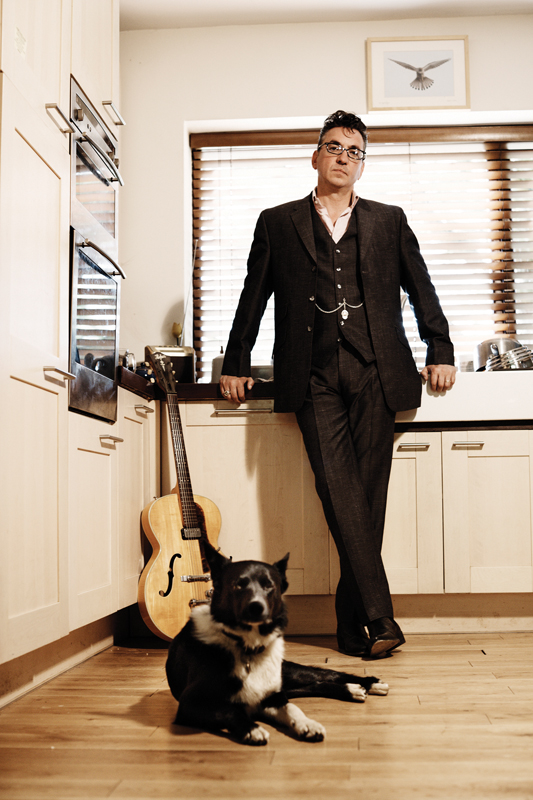
“We used a couple of Eastwood guitars – an Eastwood 12-string and an Eastwood Baritone – a lot on the album. Because it was kind of done in the shed, I thought ‘I’m probably going to replace all this’. Many years ago, I bought my daughter a no-name T-style with no brand on the headstock, and I used that loads and it sounded ace.”
“I used my ’56 Gretsch 6120 a lot and various pedals that I can’t remember exactly. On the fuzzier stuff, I used something I got into via [Standing At The Sky’s Edge engineer] Alan Moulder on the last album, an Ibanez Standard Fuzz, 70s – awesome, an absolutely ridiculous thing. It’s got these two faders on it and it’s amazing. But a lot of it was quite a pure sound, straight into the amp, no pedals at all. With this record, I just wanted to simplify everything. It’s why live we can play it as-is.”
When we witness Hawley live, peforming to a sold-out Colston Hall in Bristol, he has the crowd in the palm of his heavily arthritic hands from the get-go. Encamped at the centre of a circle of amps and monitors, he gets through an enviable roll-call of guitars, producing a towering, fearsomely loud sound, rich in expertly marshalled feedback, lacerating fuzz and luscious tremolo.
“I’ve got various guitars that I use live. My long-suffering guitar tech, Gordon, I think he likes it really… I use loads – Gretsches, Rickenbackers, Gibsons… and my excuse is I can’t stand to play a guitar that’s out of tune and I don’t have time to fuck about tuning up. The [Gretsch] 6196 CG stays in tune, you could hit it with a lump hamper and it wouldn’t go out, but the ’56 you play it one song and it’s all out. Retuning a 12-string on stage when you’re supposed to be playing a gig, I haven’t got time to be dicking about like that.”
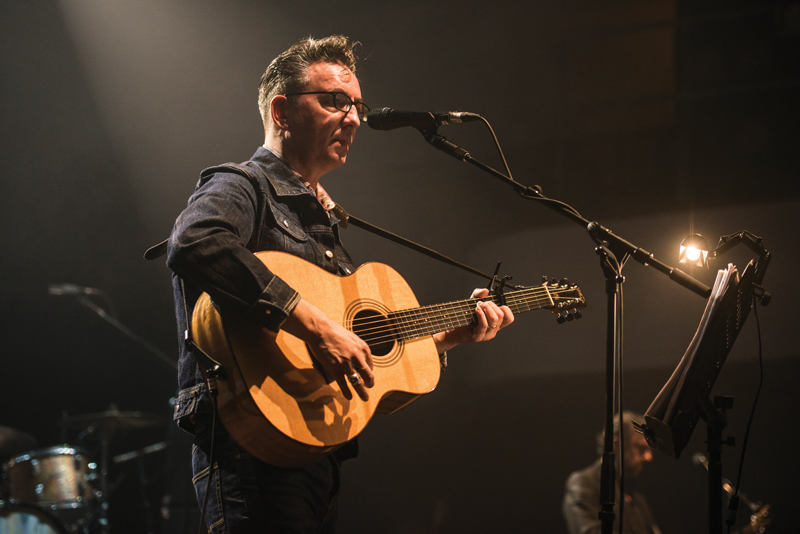
“It’s like the folk singer who was facing the firing squad and they said ‘have you got any last requests?’ and he said ‘do you mind if I tune my 12-string?’ I haven’t got time. I want to be on the mic talking to people, then onto the next song. I haven’t got time to mess about.”
Hawley’s trademark tremolo sound is present and correct on Hollow Meadows, with the Dunlop TS-1 his go-to pedal during the album sessions. He has rock ’n’ roll legend Duane Eddy, whose 2011 album Road Trip he produced, to thank for recommending it.
“There’s a few I use, and I use them in tandem sometimes,” says Hawley. “Roger Mayer sent us a Voodoo Vibe, me and Shez, and we used that on the album, but I haven’t taken it out live. I use the Dunlop stereo tremolo. When I was working with Duane Eddy he got me into that, he uses it a lot and I’ve started using it, as I love the sound.”
Like many of his releases, Hollow Meadows was named after a place in Sheffield – originally called Auley Meadows, the Hawley family have roots there dating back as far as the 14th century. Always a vocal political commentator, when asked what the mood is like in his beloved city, where many people felt betrayed by the city’s MP Nick Clegg’s cosying up to the Tories in 2010, and whether the selection of Jeremy Corbyn as Labour leader has sparked a feeling of renewed optimism, Hawley is typically forthright.
“I’m not sure Corbyn isn’t John The Baptist to a Jesus that’s going to come,” he says. “He’s the most hopeful thing that’s happened in politics for a long time and it’s given people hope, but we had that feeling with Tony Blair, so I think there’s a degree of cynicism. The unforgivable Blair, who took us to war and lied to us and all those awful things.
“It’s not just Sheffield, it’s the country as a whole. I despair of politics, I really do. I’ve got to the point where I think I can contribute more change in people’s views of things with my guitar than my vote. That’s a bit sad, as my history’s well documented, where I’m from and everything.”
“I do at least hope it stems the tide of the greed heads. What the Tories are doing, selling us off to the highest bidder, is despicable, and the stuff with the tax credits and all that, they’re just despicable people. They’re vandals, they’re not politicians and I despise them all. They should be asset stripping a company rather than a country.”
Richards’s rig
The vintage gear in Hawley’s vast guitar and amp collection is spared from live action, but he employs an equally formidable setup on the road, made up of a quartet of Fender and Blackstar amps. Backed by Shez Sheridan’s 12-string playing through a similarly sizable rig, it makes for a huge, pulverising sound – as witnessed on a recent short run of UK dates that saw Hawley in fine form, oblivious to his flirtation with paralysis a few years earlier.
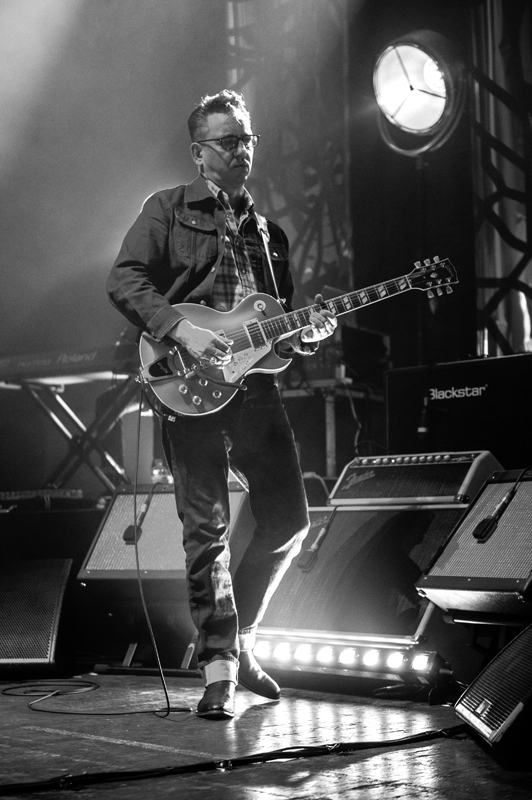
“I don’t take the vintage stuff out, it wouldn’t be fair to it. I use two Fender [Hot Rod] Deluxes, a Fender Super-Sonic and a Blackstar 30-watt Artisan Series, all of them on. It’s an immense sound,” Hawley enthuses.
“My old soundman, Mike, hated it. He was like, ‘why are you doing this? It’s too complicated’, moaning all the time. He got used to it very quickly once he heard it a few times…”
Collaborative spirit
Eight solo albums, two Mercury Prize nominations, a spell playing in Pulp alongside Sheffield friend Jarvis Cocker, of whom Hawley says “We’ll be brothers ’til the end” and numerous collaborations and production gigs have followed since his departure from indie band The Longpigs in 2000. Hawley remains keen to work with other artists.
“Call me old-fashioned, but it’s likely to happen, isn’t it?” he reflects. “I like doing it because it gets you out of yourself and makes you see your own thing in a different perspective. That’s a continuation of stuff I’ve done since the dawn of me playing, when I did sessions or got asked to do stuff because I was creative – not because I could read the dots, because I can’t read music. I guess the phone hasn’t stopped ringing and now I’ve become successful in my own right, the focus is on what they call collaboration – before, it was session guitar. I don’t know the difference to be honest.”
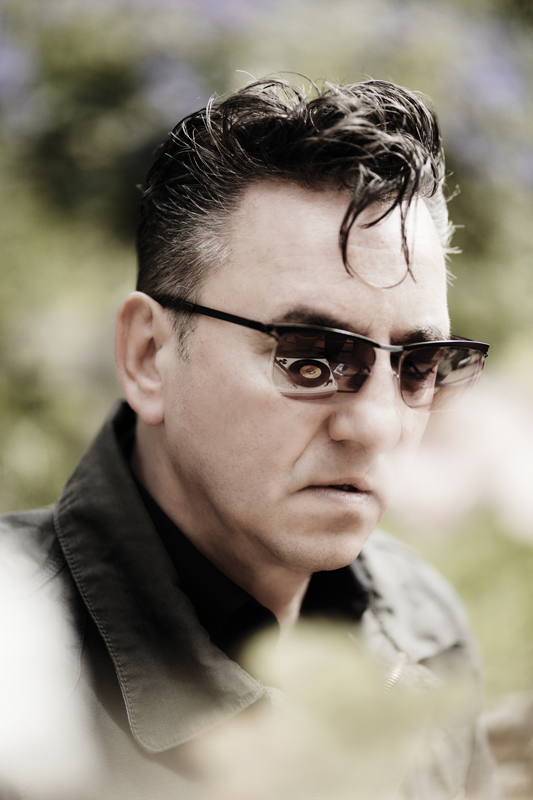
As our conversation winds towards its end, we wonder what the Hawley of 15 years ago would have made of Hollow Meadows. He recalls the advice of his father, who spent the last of his redundancy money following his departure from one of Sheffield’s steelworks in the early 80s buying a teenage Hawley his first Gretsch – a Country Gent for £295.
“I think I’d have been happy,” he replies. “It was very frustrating for many years. I was alright playing guitar [in The Longpigs], I was quite happy with that, but I’ve always wrote songs and there was always this thing in the back of my mind – I’m going to have to do this one of these days, and it was my dad who said don’t get to 60 and look back and go, ‘shit, I didn’t do it’.”
Whatever it is you want to door be, it wasn’t necessarily songs, don’t save up for it, do it now because time is an arrow that runs away from you – and very quickly – whatever it is you want to do, get on with it now because you don’t have the time to dick about.”
